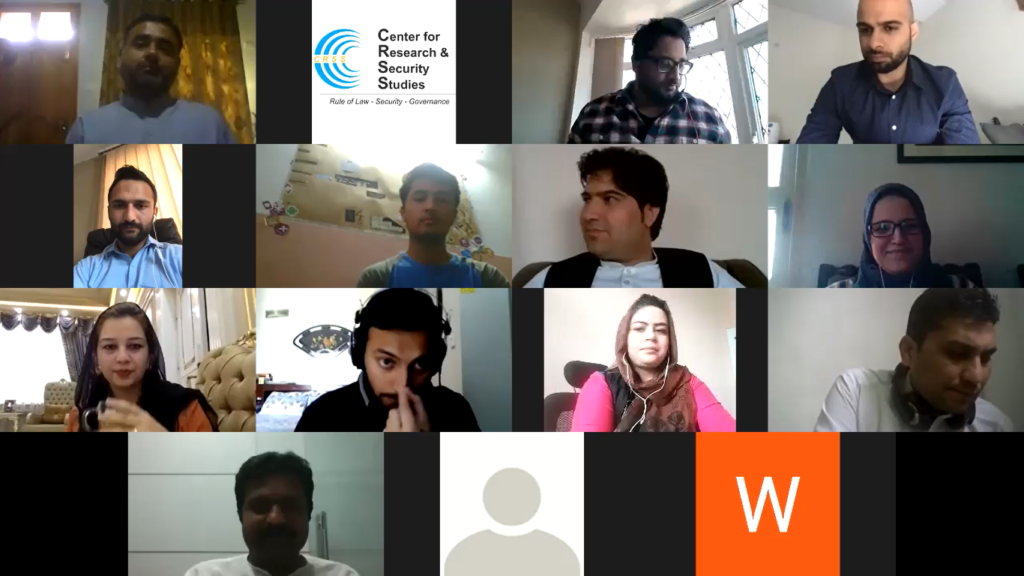April 21, 2020
As part of the Center for Research and Security Studies’ (CRSS) and Afghan Studies Center’s efforts to enhance Pak-Afghan trade relations, improve business cooperation and explore ways of developing partnerships and joint ventures, CRSS organized a virtual Pak-Afghan Youth Entrepreneurs Conference on April 20, 2020 on Zoom. Over a dozen youth entrepreneurs from both Pakistan and Afghanistan belonging to various fields came together to discuss the current challenges being faced by entrepreneurs during this global pandemic. The current impact of COVID 19 reveals that the global economy is going to take a massive hit. Furthermore, it is evident that due to COVID 19, many sectors will face enormous challenges and unemployment will also rise worldwide. Considering these factors, SMEs and entrepreneurs can capture the market share during this time.
Afghan participants included Ms. Parwarish Oryakheil, Vice President (AWCCI); Mr. Naqibullah Safi, Executive Director, PAJCCI; Ms. Spozhmai Siam, CEO Siam Business; Mr. Siam Parsalay, CEO Business Doctors; Ms. Asiya Ahmad, Co-Founder Tech Life; Ms. Weda Sabir, President, Talent Hunt Company and Ms. Marzia Panahi, Director Namad, while Pakistani participants included Ms. Fatima Anila, CEO Alvarish Pvt Ltd; Mr. Fahad Nasir, Manager Oxybridge; Mr. Aamir Malik, CEO, Time & Tune, and Ms. Wardah Usman; Manager Oxybridge. The discussion was moderated by Ms. Fatima Anila and Mr. Junaid Khan, Program Manager, Economic Connectivity, CRSS.
As the entrepreneurs came from different sectors, the idea behind the conference was to gain an insight into how various businesses are dealing with the current challenges being posed by COVID-19 and what strategies will be adapted if the pandemic persists and the global lockdown prolongs. The entrepreneurs discussed the following four sectors and presented recommendations vis-à-vis global scenarios.
- Online businesses Using e-Commerce and Digital Solutions
Recent studies have revealed that the only sector which is growing in these crises is the online businesses and e-commerce sector. Many businesses have shifted their work to the internet and are catering to their customers’ needs online. Furthermore, software and application development business has captured a huge market share as many companies are acquiring their services for developing applications. These businesses have also significantly grown in Pakistan and Afghanistan. Online medical consultations, household supplies, online equipment deliveries and many other services are being provided nowadays to several customers at their doorsteps.
However, a common issue faced by both countries is that this mechanism can work only in the metropolitan cities. For rural areas, this model is not as efficient due to poor internet connectivity and lack of e-literacy amongst the local population. Furthermore, in Afghanistan banks are yet to introduce e-commerce/online payments. Hence, they are still collecting cash payments whilst delivering items; thus, creating a safety concern in this situation. Therefore, there is a requirement of SOP’s to be in place for delivery persons. Due to the lockdown, another major concern that has arisen in the businesses of both countries is ensuring the timely deliveries of items.
To conclude, although there are still many discrepancies and short falls in this industry across Afghanistan and Pakistan, this is the only profitable business during these worldwide crises. It has not only retained its employees but has seen a significant growth nowadays due to the decrease of human contact. If the situation persists, many businesses could pivot their models to online solutions in order to sustain.
- Women-Led Businesses and SMEs
Unfortunately, this sector has taken a huge blow in both countries. In Afghanistan, around ninety women-led businesses out of one hundred have completely shut down their operations and laid of the women staff. A recent study from USAID has revealed that these women SME’s have lost around $300,000 revenue due to COVID 19. Several good items such as Saffron, dry fruits, eatables and many embroidered items are piled up in storage but cannot be sold or delivered.
However, the Afghan Women Chamber of Commerce and Industries (AWCCI) has approached Afghanistan’s President H.E Ashraf Ghani regarding this matter. The chamber has suggested him to provide motivational packages to women entrepreneurs. Furthermore, they have requested him to introduce interest free loans and easy taxation laws to women-led businesses and issue them grants so that they can regain their businesses. The President has ordered the National Procurement Authority to include women-led businesses and have listed their businesses in emergency relief works as well.
One of the suggested businesses which is globally carried out by businesswomen is stitching of the Personal Protective Equipment (PPE) and other items required for medical professionals and paramedics currently treating COVID-19 patients. Pakistan has already initiated this process locally and many women entrepreneurs are participating in creating and delivering these essential items. Although, AWCCI has expressed a keen interest in manufacturing PPEs, the only concern is that in Afghanistan the required raw material is not easily accessible. Furthermore, the price of the raw material has increased enormously making it difficult for the women businesspersons to procure and manufacture. They have raised these concerns with the government and are hoping to initiate manufacturing of the required equipment once these issues are resolved.

- E-learning and Online Education
Another key concern faced by both countries during lockdown is that the closure of schools and colleges has resulted in the lack of educational development of the younger generation. They are not following a proper timetable which is affecting both their physical and mental health. As some of the entrepreneurs from the youth entrepreneurs core group are specialized in online teaching and e-learning, they suggested that many entrepreneurs could assist schools and colleges in devising e-learning mechanisms. They further suggested that students should be taught through animations to make learning interesting and creative for them. Furthermore, if the lockdown persists, educational packs with certain experiments that can be performed indoors should be provided to students. Moreover, entrepreneurs from an education background could provide online training to parents as well so that they are able to easily instruct their children and assist them with their learning and development whilst indoors. Entrepreneurs could suggest these ideas to both governments as well as private stakeholders in order to reach out to potential stakeholders.
Both governments have introduced educational channels in order to facilitate their students. However, the above-mentioned initiatives could help the younger generation to keep up their learning abilities during lock down.

- Pak-Afghan Bilateral and Transit Trade
Another sector which is currently experiencing a major setback due to COVID-19 is the Pak-Afghan Bilateral and Transit Trade. Although closure of borders for trade has huge financial implications, both governments took this tough step to prevent the spread of the Corona Virus. This has resulted in a huge financial loss to business stakeholders across Pakistan and Afghanistan.
However, after the intervention of the business community, both ministries of commerce have decided to facilitate the movement of the cargo trucks into Afghanistan through the Torkham and Chaman borders. However, it is now restricted to three days only, whereas previously it was in operation 24/7. Due to time limitation, there are still many containers stuck at borders resulting in demurrages and excessive rent charged by the shipping lines. The business community has requested the Pakistan government to reconsider opening the Torkham border 24/7 again to facilitate them. Furthermore, they have requested the Pakistan government to restart the bilateral trade with Afghanistan as it is not only affecting Pakistan’s economy, but Afghanistan is also experiencing a dearth of essential items which were previously exported by Pakistan.

Joint Recommendations
Upon conclusion of the conference, all entrepreneurs recommended a number of strategies based on their professional background which can be adopted by business stakeholders in order to scale their businesses across Pakistan and Afghanistan.
- Afghan entrepreneurs should look for opportunities to collaborate with the established start-ups in Pakistan and maybe work on developing some helplines for health – quick responses in usual and day to day affairs.
- Indigenous product development & delivery would be more sustainable for businesses in the coming months, however, the digitization and use of technology would be helpful in collaborating for quality management of indigenous productivity.
- Youth Entrepreneurs across both countries should view the chart that highlights which 100 businesses have grown within this situation and which 100 businesses have failed. The entrepreneurs should digitalize their businesses and start to use the online platforms.
- As Startups and SMEs have limited resources, they should focus on using collaboration tools such as G suite, Trello or slack send in blue to share documents, manage social media. Furthermore, they can use firebase by Google to develop apps quickly.
- Both Governments should support SMEs and women-led businesses to become operational again and assist them in eradicating any issues that are arising due to the pandemic. Furthermore, as suggested above the Afghanistan government should assist in providing raw material to women entrepreneurs for the manufacturing of PPEs and other products.
- Startups can pivot their business with respect to current situation and move forward as per the current requirement.
- Pakistan Afghan business stakeholders requested Pakistan government to consider opening Torkham and Chaman 24/7. Otherwise, it will take several months for the stranded cargo to cross to Afghanistan, causing irreparable losses to the private sector.
- The business community has requested the Pakistan government to restart bilateral trade with Afghanistan as it is not only affecting Pakistan’s economy, but Afghanistan is also facing a dearth of essential items which were previously exported by Pakistan.
- Lastly the entrepreneurs highlighted the importance of acquiring and teaching essential skills during this situation. They also emphasized the significance of buying local goods to support local communities and create awareness amongst the society regarding this pandemic.
This report is written by Junaid Khan who is a Program Manager at the Center for Research and Security Studies (CRSS).










